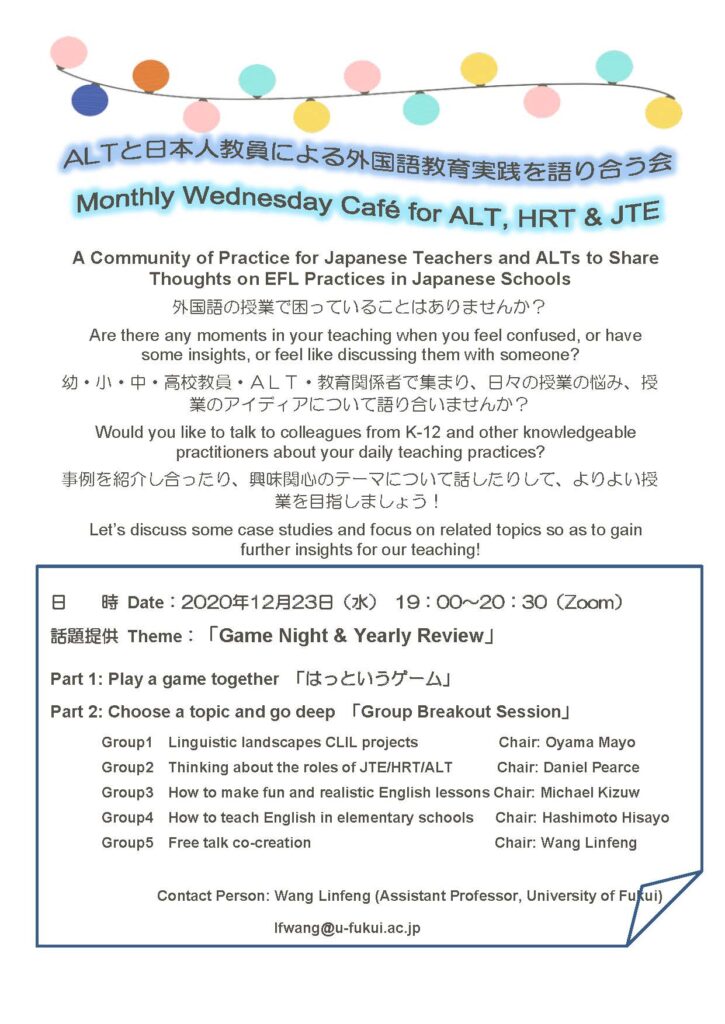School-based Teacher Education Model in Professional Graduate School
For the past 13 years, the M.Ed program at the Graduate School of Professional Development of Teachers at the University of Fukui has been working on cultivating an organizational learning community of teachers. Our aims are clear: to enhance the professional development of school teachers, primarily using the school-based teacher education model.
As a national pilot graduate school of teachers’ professional development, we’re leading the way in our practice-based theorization approach. This unique opportunity has paved the way for Fukui’s school-based teacher education model to be at the cutting edge of teacher education reform through its collaboration between universities, schools, and administrations.
In practical terms, our program works like this: instead of having teachers come to the university to take lectures, university teams visit schools to have lesson study sessions, participate in school research meetings, and set consulting case study meetings that support the whole school.
We’ve been finding that any challenges and problems at schools are discovered and solved by teachers as insiders (Reed, 2020 presents research on how teachers as insiders in junior high schools are best placed to identify issues and, through collaboration, work to resolve them).
We’re also paving the way in establishing distributed community networks and enhancing solidarity. For example, as a team school advocated by MEXT we try to be inclusive, and at present have three ALTs enrolled in the program as school middle leaders; a number we aim to expand on in future years.
Teachers Learn by Doing as Reflective Practitioners
Our program acknowledges the significance of reflection in teachers’ professional development and is guided by the basic principle; teachers learn by doing, as reflective practitioners.
Both pre-service and in-service teachers, who are enrolled in the M.Ed program nationwide carry out long-term internships in partner schools which collaborate with the university and the local board of education.
Pre-service teachers enrolled in the lesson study approach go to schools three days a week over two years in partner schools (significantly more than the two weeks of standard university teacher trainer courses in Japan and in line with teacher training in other developed countries). In the schools, they learn school routines, observe and reflect on practices, assist, and teach. Following this practice-based approach, pre-service teachers return to the university for reflection meetings once a week. When teaching, university teachers go to partner schools as a team to observe and have post-lesson study meetings immediately after classes.
Incorporating these steps into our course design supports in-service teachers to fulfill their duties in their affiliated schools as both practitioners and researchers. They come to the university to have reflection meetings with pre-service teachers once a month. University teams visit their schools regularly to attend teachers’ research meetings and school-wide lesson study meetings, as well as share ideas on how to motivate and organize teacher-initiated lesson study meetings.
In doing so, learning communities of teachers across ages, school levels, districts, subjects, and roles are cultivated in this graduate school.
The outcome is for teachers to enhance their career options to eventuate in positions such as school middle leaders or school reform management roles.
A Community of Practice for ALTs, HRTs, and JTEs to Reflect Practices
You (the reader) are welcome to be a part of this – for free, and from your house/apartment. One goal of professional development (that ALTTO has been consistent in building since 2015) is to build up organizational cultures, to encourage teachers to support each other and share their own practices, even through writing narrative reflections (formally or through ALTTO’s multiple SNS channels).
For decades ALTs have not generally been invited to subject meetings nor school-based research meetings (see Jessie J Lucky’s guest blog on this), so, unfortunately, there is little structure to include ALTs in institutional professional development opportunities.
As a result, various professional development initiatives have been set up by local board of educations, universities, NPOs (like ALTTO), and others for decades.
Seeing how easy it is to move online and bring hundreds/thousands of people with shared interests together, we launched a monthly café in January 2020. Join us on the last Wednesday evening of every month to talk with ALTs, HRTs, JTEs, researchers, and people who are interested in foreign language education around, and even beyond Japan.
Every participant is encouraged to take the initiative to chair one of the meetings by providing topics, materials, and lesson videos to stimulate group discussions.
If you are interested in subscribing to receive former newsletters and forthcoming notices, sign up here to register, read about what your co-workers have been up to, and get the link to the next cafe.


